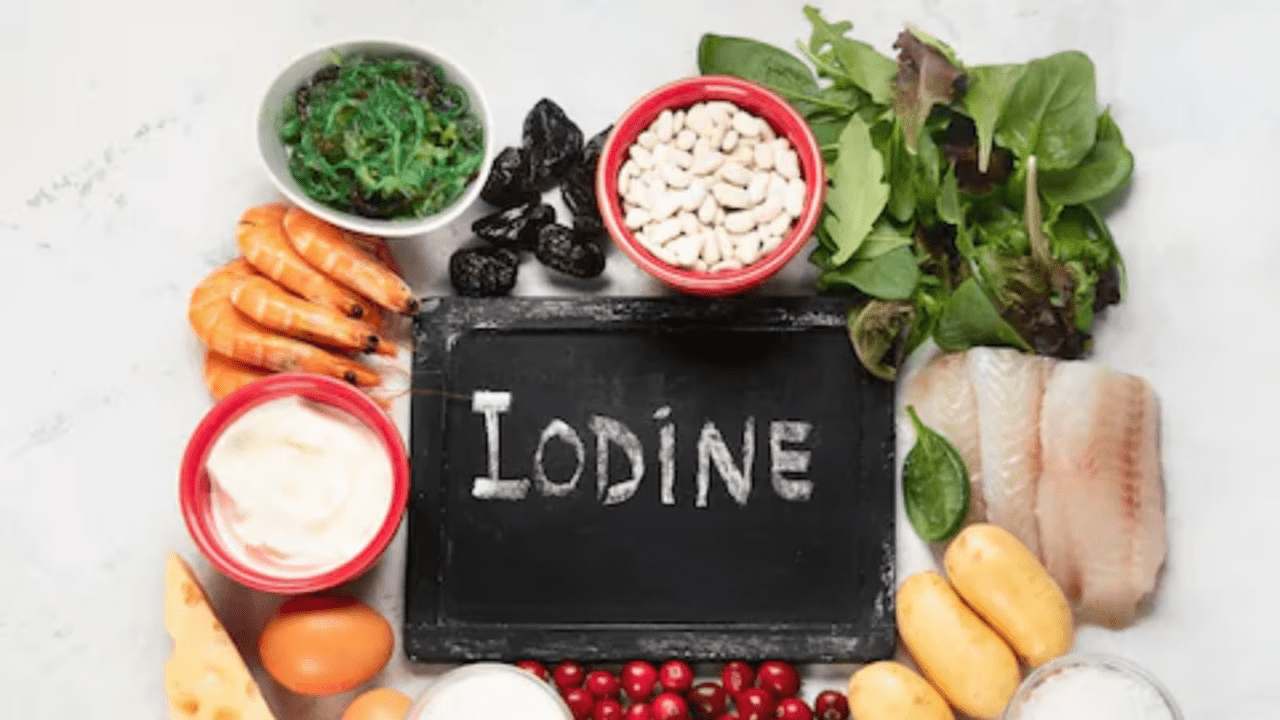Introduction to the Significance of Iodine in Hormonal Balance
Furthermore, iodine deficiency can disrupt the delicate balance of thyroid hormones, resulting in various health issues such as fatigue, weight gain, and cold intolerance. The impact of hormonal balance on metabolism and energy regulation underscores the critical role of iodine in maintaining overall well-being. Therefore, ensuring sufficient iodine intake is essential for supporting thyroid function and promoting optimal hormonal balance.
Iodine deficiency can lead to decreased thyroid hormone production, causing hormonal imbalances that affect various bodily functions. For example, inadequate iodine levels can result in hypothyroidism, a condition characterized by an underactive thyroid gland. This hormonal disruption can manifest in symptoms such as fatigue, weight gain, and sensitivity to cold. Additionally, iodine deficiency is closely linked to the development of goiter, a visible enlargement of the thyroid gland, further highlighting the consequences of hormonal imbalances due to insufficient iodine intake.
Moreover, the correlation between iodine deficiency and metabolic disorders underscores the broader impact of hormonal disruption on overall health. Metabolic disorders, such as irregularities in energy regulation and weight management, can arise from inadequate levels of thyroid hormones resulting from iodine deficiency. By addressing iodine deficiency through dietary modifications or supplementation, individuals can mitigate the risks associated with hormonal imbalances and support their metabolic health.
Risks Associated with Excess Iodine Intake and Hormonal Effects
Maintaining iodine intake within recommended levels is crucial to prevent disruptions in hormonal equilibrium and mitigate the risks associated with excess iodine consumption. Balancing iodine intake is essential for supporting thyroid function and ensuring optimal hormonal health. By adhering to the recommended daily allowances of iodine and being mindful of iodine sources in the diet, individuals can promote hormonal equilibrium and safeguard their well-being.
For example, the risk of hyperthyroidism due to excessive iodine intake (even though this is rare) highlights the importance of moderation when incorporating iodine-rich foods into the diet. While iodine is essential for thyroid function and overall health, consuming excessive amounts can lead to hormonal imbalances that have detrimental effects on the body. By being mindful of iodine intake and following recommended guidelines, individuals can maintain hormonal equilibrium and prevent the risks associated with excess iodine consumption.
Sources of Iodine for Hormonal Health
Seafood, such as fish and shellfish, serves as a primary source of iodine, essential for the synthesis of thyroid hormones that regulate metabolic processes and growth. By regularly including seafood in their diet, individuals can ensure adequate iodine intake to support optimal thyroid function and maintain hormonal balance. Additionally, seafood offers a rich source of omega-3 fatty acids, beneficial for heart health and overall well-being.
Dairy products, including milk, yogurt, and cheese, are valuable sources of iodine that can contribute to supporting thyroid function and hormonal health. These dairy options not only provide iodine but also deliver essential nutrients like calcium, crucial for bone health. By incorporating dairy products into their meals, individuals can enhance their iodine intake and promote hormonal equilibrium, along with other health benefits associated with dairy consumption.
For the vegetarians and vegans seaweed varieties like nori, kombu, and wakame are potent sources of iodine commonly found in Asian diets, offering significant benefits for thyroid health and hormonal balance.
Also algae like Spirulina and Chlorella are good sources for iodine which are suitable for plant based eaters.
These seaweed varieties contain substantial amounts of iodine, making them valuable additions to a diet focused on supporting thyroid function and overall well-being. By incorporating seaweed into their meals or enjoying dishes with seaweed, individuals can boost their iodine levels naturally and contribute to maintaining hormonal equilibrium.
Incorporating iodine-rich foods like seafood, dairy products, and seaweed/algae into the diet plays a crucial role in supporting optimal thyroid function and hormonal health. By diversifying food choices to include these sources of iodine, individuals can proactively enhance their iodine intake and promote hormonal balance for overall well-being. Emphasizing the consumption of iodine-rich foods is a practical approach to maintaining thyroid health and supporting hormonal equilibrium across different life stages.
Benefits of Iodine Supplementation on Hormonal Balance
Iodine supplementation is instrumental in correcting iodine deficiencies and supporting the production of essential thyroid hormones critical for hormonal balance. By ensuring optimal iodine levels in the body through supplementation, individuals can effectively promote hormonal balance and enhance metabolic function. For example, individuals with iodine deficiencies may experience symptoms such as fatigue, weight gain, and cold intolerance due to an underactive thyroid gland. Supplementing with iodine can help address these deficiencies and restore hormonal equilibrium, leading to improved energy levels and overall well-being.
Moreover, iodine supplementation is particularly vital for individuals following restrictive diets, for individuals who are borderline hypothyroid and would like to prevent a clinical manifestation or with limited access to iodine-rich foods such as seafood and dairy products. These individuals are at a higher risk of developing iodine deficiencies, which can significantly impact hormonal balance and overall health. Therefore, incorporating iodine supplements into their daily routine can help bridge the gap and ensure they meet their recommended iodine intake levels for optimal hormonal function. By addressing iodine deficiencies through supplementation, individuals can minimize the risk of hormonal imbalances and related health issues, ultimately supporting their well-being and vitality.
In addition to correcting deficiencies, iodine supplementation has been linked to improved cognitive function and hormonal regulation, especially in children and pregnant women. Ensuring adequate iodine levels during critical developmental stages is essential for optimal brain development and hormonal balance. Therefore, incorporating iodine supplements as part of a balanced diet can have far-reaching benefits beyond hormonal health, positively impacting cognitive development and overall physiological well-being. To explore the advantages of iodine supplementation further and its role in enhancing hormonal balance, individuals are encouraged to visit the Autumn Falk Naturopath website at Autumn Falk Naturopath website.
Impact of Iodine on Cognitive Development and Hormonal Regulation
Iodine’s influence extends beyond hormonal balance to encompass cognitive development, particularly in critical developmental phases. Researchers have highlighted that iodine is crucial for optimal brain function, especially during early childhood. For instance, inadequate iodine levels during pregnancy and infancy can result in cognitive impairments, affecting learning abilities and overall brain health. This underscores the significance of maintaining adequate iodine intake from sources like seafood, dairy products, and iodized salt to support cognitive development and hormonal equilibrium.
Moreover, the correlation between iodine levels and cognitive function emphasizes the interconnectedness of iodine with hormonal regulation. Studies have shown that iodine deficiency can not only impair cognitive abilities but also disrupt the delicate balance of thyroid hormones, leading to metabolic irregularities. This dual impact underscores the importance of sufficient iodine intake for maintaining cognitive health and hormonal equilibrium throughout life stages. By emphasizing the critical role of iodine in cognitive development and hormonal regulation, individuals can make informed choices to support their overall well-being and vitality.
Special Dietary Recommendations for Pregnant Women and Hormonal Well-being
During pregnancy, the demand for iodine significantly rises to maintain hormonal equilibrium for both the mother and the developing fetus. Iodine plays a vital role in supporting healthy hormonal changes during pregnancy, ensuring the proper functioning of the thyroid gland and overall well-being. For pregnant women, incorporating iodine-rich foods into their diet is essential to meet the increased hormonal demands and support optimal health throughout the pregnancy.
Seafood, particularly fish, is an excellent source of iodine and can be beneficial for pregnant women to enhance their hormonal well-being. Additionally, dairy products such as milk and yogurt can contribute to meeting the elevated iodine requirements during pregnancy. By consuming a balanced diet rich in iodine-containing foods, pregnant women can help prevent hormonal imbalances and support the healthy development of both themselves and their babies. For personalized advice on maintaining hormonal balance during pregnancy, consulting a healthcare provider or a naturopath like Autumn Falk Naturopath can provide tailored recommendations and support for an optimal pregnancy journey. Explore further insights on hormonal well-being and natural health at Autumn Falk Naturopath website.
Recommended Iodine Intake for Hormonal Balance Across Life Stages
It is essential to address the varying iodine needs across different life stages to maintain hormonal balance effectively. For instance, infants require a minimal amount of iodine for healthy growth and development, with the recommended intake gradually increasing as they transition into childhood and adolescence. Adolescents, especially during puberty, have higher iodine requirements due to the rapid changes in hormonal levels during this phase.
Moreover, adults also need to be mindful of their iodine intake to support metabolic functions and hormonal balance throughout their lives. Pregnant and breastfeeding women have heightened iodine needs to facilitate healthy hormonal changes and ensure optimal development for both themselves and their babies. Understanding these specific requirements can guide individuals in making informed dietary choices to meet their iodine needs adequately.
Considering the impact of iodine on hormonal equilibrium, it is crucial for older adults to maintain sufficient iodine levels to support metabolic rate regulation and overall health. By incorporating iodine-rich foods into their diets, such as seafood, dairy products, and iodized salt, individuals can proactively promote hormonal health and prevent imbalances. These dietary adjustments can play a significant role in sustaining hormonal equilibrium and supporting overall well-being across various life stages.
Conclusion: Optimizing Hormonal Balance with Iodine Supplementation
Iodine supplementation is a critical factor in maintaining hormonal balance within the body. From supporting thyroid function to regulating metabolism, iodine plays a multifaceted role in ensuring overall health and well-being. For instance, iodine deficiency can disrupt the delicate balance of thyroid hormones, leading to hypothyroidism, goiter, and other negative health effects. This disruption highlights the critical impact of hormonal balance on various bodily functions, including metabolism, energy levels, and cognitive processes.
Furthermore, incorporating iodine-rich foods like seafood, dairy products, and seaweed into the diet can significantly contribute to optimal thyroid function and maintaining hormonal balance. For example, iodized salt, a common source of iodine, plays a vital role in preventing iodine deficiency and maintaining hormonal balance. The importance of meeting the recommended daily allowances of iodine for different age groups cannot be understated, as it directly impacts hormonal health across various life stages. To ensure hormonal balance and overall well-being, individuals are encouraged to explore the benefits of iodine supplementation and make informed choices about their iodine intake. For more information on optimizing hormonal balance with iodine supplementation, visit Autumn Falk Naturopath website.





